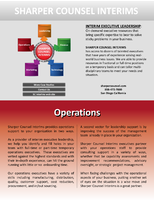Enjoy "Stress-Free" Welding, Bending, Cutting of Metals Parts Leveler can "Stress Relieve" Metals for Downstream Processes
Parts leveler can "stress relieve" metals for downstream processes
Parts leveling can't free you from the stress caused by a missed shipping date, but it CAN relieve your production frustrations caused by metal components loaded with internal stresses that are released during welding, laser cutting, punching or bending.
Flat doesn't always mean stress relieved
"The material coming from a service center has probably been leveled at some point, but most metals retain internal stresses and a degree of coil defects that make setup, processing or assembly difficult downstream," says Nicholas Miller, Technical Director at ARKU Coil Systems. "Even material that appears perfectly flat may have internal stresses that are released during stamping, cutting or bending. The reason is that most upstream leveling processes don't sufficiently work the material past its yield point, which is key to realigning the stresses in a single direction."
Exceeding yield point key to stress relief
The servo-hydraulic parts leveler is uniquely designed for this purpose, Miller says. "This type of leveler uses a series of closely-spaced, small-diameter rollers – supported by large rollers to prevent deflection – to bend material sharply through a wave-like path to stretch the metal past its yield point," he explains. "After the initial sharp bend, the material is gradually returned to a flat state as it passes through the leveling rollers and exits the machine. Small-diameter rollers with a small roller pitch produce a sharper bend, ensuring the material is stretched past its yield point."
Excellent results easily achieved
"The effect on material is quite different from a gantry hammer press, press brake, roll former, flame and hammer or any other leveling method," Miller emphasizes. "The hydraulic leveler is also fast, often giving the desired result on the first pass while others require multiple hits and checks. And it doesn't take an expert to achieve great results on the first pass. It can take years for an operator to become an expert with a hammer press, and if that person leaves your company, it's a real handicap. Even in the hands of an expert, a hammer press can't stress-relieve parts, though they might appear flat."
Parts leveling isn't strip leveling
Most important, the servo-hydraulic leveler is versatile because it's "smart." "Servo-hydraulics adjust the leveling force instantly to compensate for the varying cross section of parts with large cutouts and perforations, or shapes such as triangles and circles," Miller explains. The mechanical leveler on a coil line is not designed to do this. The hydraulic leveler is also ideal for appearance critical parts required for medical, packaging machinery, food, beverage and scientific applications. There's no marring, slag, or discoloration from heat.
"Fast leveling capability on the factory floor is a proven way to increase productivity and reduce rework," Miller adds. "Welding robots find seams reliably with leveled parts. Setups are faster. Welding, cutting and bending results are more predictable. As a bonus, you can salvage material that does not meet flatness specs as it comes from the service center." For more, check out the YouTube videos at www.youtube.com/ARKURichttechnik.
Nicholas Miller holds a BSME degree from Purdue University, and B.S. degrees in economics and Science from Butler University. He has served as a design engineer at both Toyota and ARKU, prior to his current role as technical director at ARKU Coil Systems, Inc.




